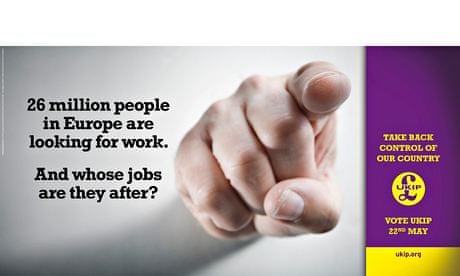And so we're off. Yesterday saw the launch of the UK Independence party's campaign for the European parliamentary elections, to be held less than a month from now, on 22 May. Ukip is widely expected to finish above the incumbent Conservatives, piling pressure on David Cameron and bolstering his backbench critics who (mistakenly) think that lurching further to the radical right on Europe and immigration will fend off the growing Ukip rebellion. But it is also firmly in the realm of possibility that Ukip will win the European parliament elections outright, raising awkward questions for the main party of opposition and its leader, Ed Miliband. It is still too early to predict the result; while recent polls suggest a very strong result for Ukip, don't forget that in both 2004 and 2009 Ukip actually did not surge until late on, during the final weeks of the campaign when voters began to notice there was an election.
Even before launching its European parliament campaign yesterday, Ukip had already attracted controversy. In sustained coverage, The Times repeatedly alleged that Nigel Farage had misused his expenses as an MEP, while in recent days many others, including Labour MPs, charged Ukip with racism after the release of new billboards that target public concerns over the impact of low-skilled EU migration on native British workers and the influence of EU law on domestic politics.
But on both of these counts the response to Ukip has been ineffective. First, the idea that attacks such as those in The Times might damage Ukip's support is quickly undermined by only a cursory look at the opinion polls; while before the newspaper launched its anti-Ukip campaign the party were averaging between 12 and 13%, in polls released since the attacks their support has risen to around 15%. This is a crude measure but the point is clear enough; most voters don't seem to notice these transparent attacks, or don't care. The same applies to earlier years, when in 1999-2000 newspapers sought to claim that Ukip had been infiltrated by the far right; even in the face of these claims Ukip's revolt trundled on to attract a record 16% at the 2004 European elections. And what about the "Godfrey Bloom effect" last autumn, which many predicted would bring an end to Ukip's insurgency? Again, most voters either didn't notice or didn't care, as Ukip's average in the polls continued to climb north.
Also, unlike in earlier years, Farage's party has fine-tuned its populist responses to these claims; contrasting the "corrupt", "out-of-touch" mainstream "establishment" and the "chattering classes" with the "pure" British people who "want their country back", and who are systematically lied to on immigration and Europe. This populist counter-attack strategy is very effective, not least because core Ukip voters already share extremely negative views about British mainstream politics, and are deeply distrustful toward all elites, including journalists. While the tabloid-style attacks on Ukip have potential to damage the party among its periphery groups of voters, who are far more sensitive to social norms – for example women, the young and ethnic minorities – the strategy is distinctly unlikely to win back the more intensely disgruntled core Ukip voters. As journalists struggle to make charges stick, they are running the risk of simply entrenching an image of Ukip in the minds of voters as a populist outsider fighting a homogeneous political elite who are in cahoots to undermine the "silent majority".
Second, dismissing Ukip's billboard campaign as nasty or racist is also unlikely to pull Ukip supporters back into the mainstream. As the European elections near, Ukip has clearly settled on a strategy of targeting its core voters, who we show in our book are financially struggling, disadvantaged, low skilled and low educated, and intensely concerned about the economic and social effects of immigration. These "left-behind" Britons were the first to be hit by Britain's embrace of the global market, and then hit the hardest by the crisis and austerity. It is these blue-collar voters who lie at the heart of Ukip's rebellion; struggling financially, feeling cut out of our political conversation and threatened by the exact type of immigration Ukip billboards are now magnifying – low-skilled migration from inside the EU. The reality is that mainstream elites cannot control this form of migration to the extent that they claim to voters they can, while some are now branding those voters who do feel concerned about the issues featured in Ukip's billboards as crude racists.
The problem with this strategy is that the concerns expressed in the posters are shared by a very large section of the electorate; in fact, when asked their views about immigration and the European Union, a staggering 70% of voters tell YouGov that people with low education and skills who are looking for low-paid work should not be allowed into Britain. Dismissing seven out of every 10 voters as racist is not a clever way of fighting a radical right populist. On the contrary it risks reinforcing the perception that a London-based, university-educated and financially secure elite has no understanding of the lives of ordinary, struggling voters, and dismisses their anxieties as bigotry. It is the Gillian Duffy effect on a wider scale. Those levelling these charges should remember that their London-focused worldview – confidently cosmopolitan and pro-migration – is the minority one in Britain. The arrogance that can often accompany this outlook is precisely what got Nick Clegg into trouble during his debates with Farage.
Many of the more thoughtful commentators in British politics have been contemplating how to have a proper conversation with Ukip-leaning voters about their fears over immigration, Europe and national identity. Ukip's approach on these issues is not the right one, but calling a large section of the electorate closet bigots for harbouring anxieties that are absent from Hampstead dinner tables is not the right one either.









